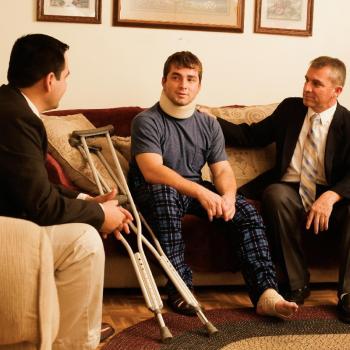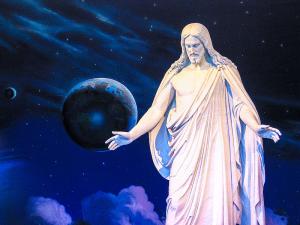This is part 2 of a 3-part discussion with Alex Griffin and Eve Tushnet. In the first post, Alex and Eve discussed discourse on homosexuality in Mormonism and Catholicism. In this post, they discuss what elements of their faiths and other faiths they have found useful in interpreting their sexual orientation. In the third post, they turn their questions toward each other. In the third post, they turn their questions toward each other.
What cultural, theological, scriptural, or ritual elements of your faith have you found particularly helpful in your experience as a gay Catholic/Mormon? Have these faith-based resources helped you approach the underaddressed questions you’ve recently mentioned; if so, how?
EVE: It would take too long to list all of the elements of my faith which have helped me navigate life as a gay Catholic! Everything from the imagery of the Church as Bride of Christ to the history (and Scriptural precedent) of viewing same-sex friendship as a form of devoted love and kinship. There’s the emphasis on sacrifice as a normal part of Christian life, not something to be ashamed of, and the art and liturgy which feed the senses and honor the body.
There’s certainly a rich theology of celibacy, and many role models for celibate life, but to be honest those haven’t influenced me as much as maybe they should have. I’ve read some stuff aimed at those in religious life (priests, monks and friars, and nuns) about how to integrate one’s sexuality as a celibate person, rather than repressing or denying it, but I admit that I never remember it once I’ve put it down. The theology of friendship has been much more vivid to me, much more memorable. St Aelred’s Spiritual Friendship and Alan Bray’s historical study The Friend really became touchstones for me, showing me what same-sex love within Christian ethics could be.
It may be worth saying that the Catholic sexual ethic is extraordinarily demanding for straight people, too. It’s really hard, whether you’re single or married, and everybody falls short of it pretty dramatically at one point or another (and another, and another…), which in turn–ideally, anyway–leads to a constant emphasis on mercy. Humility in the face of our own weakness; acceptance of the fact that we’ll often be angry, confused, or resentful about the demands of obedience; trust that the Church has the authority to guide our lives even when we believe we can’t do what She asks of us. Seeing straight people go through that stuff helps me see that we’re all in this together. I think we have to be realistic about the differences between the situations of straight and gay people within the Church, but we can also offer each other solidarity and mutual support.
ALEX: To me, Mormon concepts of family have been really helpful. In the present this is often restricted to really narrow ideas of the nuclear, heterosexual family, but historically this was often taken to include things like ritual adoption. I’ve found ideas of this kind of extended family useful in thinking about what life might look like for queer Mormons in a religion so focused on marriage. Additionally, the specific strain of Mormon regional culture I was raised in values time spent with extended–not just immediate–family, which has been really valuable to me. When one of my cousins has a kid, gets married, or so forth, my presence is expected, and I keep in close contact with most of my aunts, cousins, uncles, and others.
Then there’s a cluster of related things: personal revelation, freedom of interpretation in certain arenas, and the lack of a systematic theology. Lacking a systematic theology basically means that nobody’s a theologian–and thus, that everyone’s a theologian. I have cherished the ability/necessity to work through various things that there’s no official answer for–and accepting that not all Mormons are, by any means, going to share that interpretation.
I often feel like a big hypocrite because my church attendance is in the dictionary under “extremely spotty,” but I think the ward and stake system is also tremendously valuable. Basically, you’re expected to go to church within the designated geographic unit you’ve been assigned; you’re not supposed to “ward-shop” or look for a ward that’s “better” suited to you in whatever way. This means that you have to figure out how to love people you don’t necessarily like and who might not like you, which I think is not just a useful life skill but spiritually valuable for people of any sexual persuasion.
MICHAEL: While Mormonism, unlike Catholicism, doesn’t have its own historical and theological wealth of resources on friendship, we have the fertilizer to grow some. For instance, in official and popular LDS discourse on the pre-mortal life, friendship holds a significant place (despite retroactive incursions of romance and the nuclear family–I’m looking at you, Saturday’s Warrior); there is certainly room for speculation about how friendship can contribute to eternal progression on this Earth and beyond.
Another thing I think LGB Mormons should consider is the example of the Anti-Nephi-Lehies from the Book of Mormon. These Lamanites swear to never again take up weapons of war due to their newfound Christian aversion to their personal and culturally-ingrained proclivities toward bloodshed; of their own initiative, they seal their oath with a covenant with God. Later, they would not even take up the sword in defense of their religion, their wives, and their children and hundreds perished as a result. Yet far from dismissing this covenant as ecclesiastically invalid or as a heinous, slothful negligence of their civic and moral duty to defend the defenseless, high priest Helaman refuses to allow the people of Ammon to renege on their promise to God. The Anti-Nephi-Lehies seem to set a precedent for groups of believers who wish to contract binding covenants with God outside of the rituals of the Church that yet merit the Church’s approval.
In the same vein, I believe it might be justified for LGB Mormons who cannot (for some reason) enter into a mixed-orientation marriage to make an ad hoc, particular covenant of celibacy in order to relieve the stress of finding a potential partner; free up time and energy to dive into service of family, neighbors, coworkers, and fellow church members; end the liminal state in which they are misinterpreted as perpetual adolescents selfishly delaying marriage; and help others acknowledge their faith and particular challenges.
What interfaith resources have helped you as a lesbian person of your faith in the past? What recommendations could you give for interfaith work in this area?
EVE: Mostly books. The Friendis super Anglican, much more Protestant than its author, Alan Bray, seems to think it was. Same-Sex Desire in Victorian Religious Cultureis High Church Anglican as well as Roman Catholic. Also the “kiss of peace,” a liturgical element which I’ve written about (link forthcoming), and obviously Eastern traditions of adelphopoeisis, “brother-making.” I should also mention Wesley Hill (author of Washed and Waiting: Reflections on Christian Faithfulness and Homosexuality and Spiritual Friendship: Finding Love in the Church as a Celibate Gay Christian) and A Queer Calling, who are non-Catholics whose writings have influenced me a LOT.
ALEX: I firmly believe that interfaith stuff and contact with queer people from other, especially non-Protestant, religious traditions was crucial to me arriving at a place where calling myself a queer Mormon wasn’t simply a weird joke. One of the first places I found this was with queer Muslims, actually, and then with queer Jews and Catholics. I think it took finding people from outside of that Protestant model, with its extreme focus on individualism, for it all to make sense to me. I’ve felt this way a lot about Mormon feminism as well: so much of it is patterned on Protestant feminisms, but I think Muslim and especially Jewish feminisms would be much more useful models.
One of the things I found valuable in engaging with queer non-Protestants was a sense of loyalty to a specific tradition. If I got told one more time that me becoming an Episcopalian would fix everything, I think I would’ve snapped.











